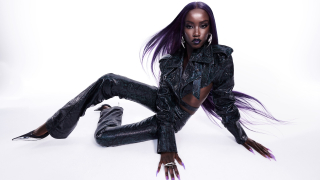When it comes to culture, Black folks around the world have been the blueprint. Whether it be literature, entertainment or fashion, the ingenuity we have imparted on society is indelible and deserving of praise and visibility. What makes the African diaspora so grand is that so many sub-cultures contribute to the whole of our phenomenal achievement and impression globally. This is especially true when looking at the trends we have started in fashion.
Meeting at the intersection of history and fashion, costume historian Shelby Ivey Christie is committed to uncovering the role African Americans have played in the ever-evolving nature of the fashion industry. A North Carolina Agricultural and Technical State University graduate, her love of "examining fashion through the lens of race, class and culture" transcended the classroom and allowed her to blaze her own career path.
Shelby Ivey Christie spoke with EBONY about fashion's role in Black history and the importance of honoring African American contributions to the fashion space and beyond.
EBONY: Contrary to popular belief, fashion has been integral to Black history. What are examples of Black cultural movements that benefitted from fashion to further promote their missions?
Shelby Ivey Christie: I think there are so many beautiful examples. A historical period that comes to mind first is the Civil Rights Movement. Those of that era used their self-image within a time where television and publicly televised protests were new. It was crucial that they utilized fashion and their appearance to make a statement about the Black experience in America. They had to showcase that Black people were indeed clean and worthy to exist. They had to dress as a way to combat these stereotypes about African Americans during the civil rights protests because they knew it would be televised. They put on their Sunday's best and made statements through clothes. The Black Panther Party did so as well. Their leverage of leather was integral. So was their uniform with the color black, and the hue itself being a statement alongside their message. There was also a sense of gender neutrality in their uniform as there was gender neutrality in the Black Panther organization. What did that mean for how we saw women show up in the Panther Party versus men? We saw women hold powerful ranks within the organization and how they leveraged their method of dress to do so.
Are there elements of Black fashion history that you find to be just so profound that you find yourself returning often to draw inspiration from?
I think for me what I enjoy discovering most is the African American place in the larger Black diaspora. A great deal of contributions specifically made by African Americans in history get blanketed as just being Black. We are Black, but we are specifically African American. So making sure our cultural exports as African Americans are always interpreted correctly is important to me. Additionally, the question of how do we reconcile our cultural export to the mass audience and to our own within our own Black diaspora is one that intrigues me as well. How do we keep track and speak up for our own attribution within the diaspora to say, "Hey, K-pop and streetwear are African American inventions." This is not to say that it did not spread into other parts of the diaspora and has now been adapted by the world. But that's really interesting to me, as a Southern African American, just to see how much of specifically African American culture drives culture throughout the Black diaspora and in the world. We call things Black, which it is, but we don't always call it African American. How do we, as a people with America as our home, share these innovations with others? Why is it discounted because folks believe we don't have a "geographic location" to call our own? This is a fairly new concept of digging into how African Americans can take more ownership and attribution of our contributions.
Cultural appropriation in fashion is still a very popular debate across American society. How can we balance having a reverence for and properly attribute the success of certain trends to Black history while simultaneously consuming fashion and keeping up with such trends?
I think it's a very complicated answer. But I think most immediately, as you said, it is about attribution rather than appropriation. You should say where something is from by giving the historical and cultural context. Or if necessary, it might need to be a layered explanation. Recently, on Twitter, a menswear expert talked about how menswear shoes used to be very formal and now people wear all of these colored loafers which is now chic in menswear. The example used was an image of colorful shoes and they further explained how things that originated in Black culture are now considered formal when they always haven't been. So, additionally, it may be productive to make a caveat about trends in fashion having different meanings or different implications across culture than how it's been adopted at the moment.












